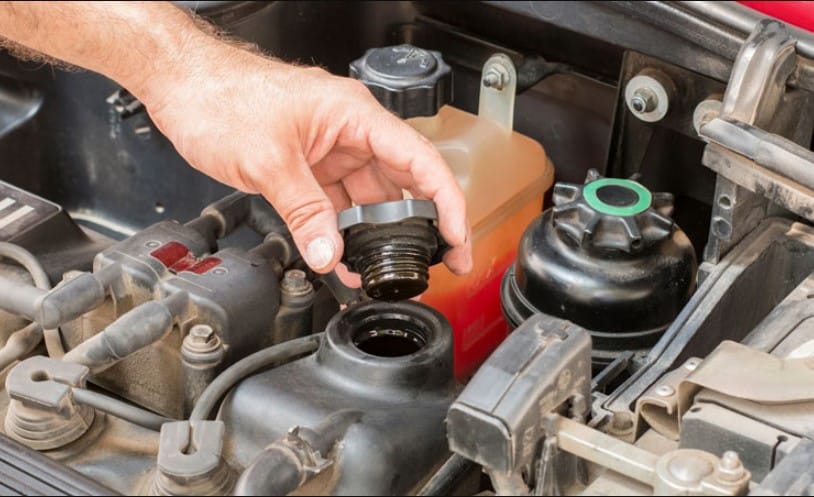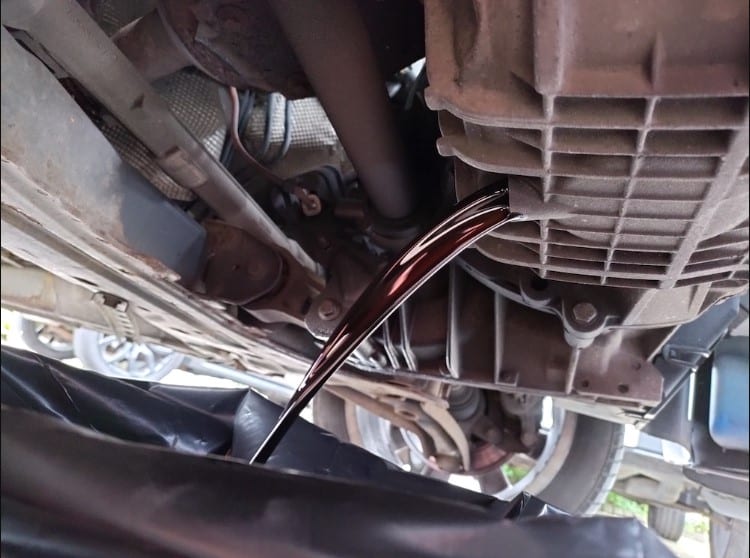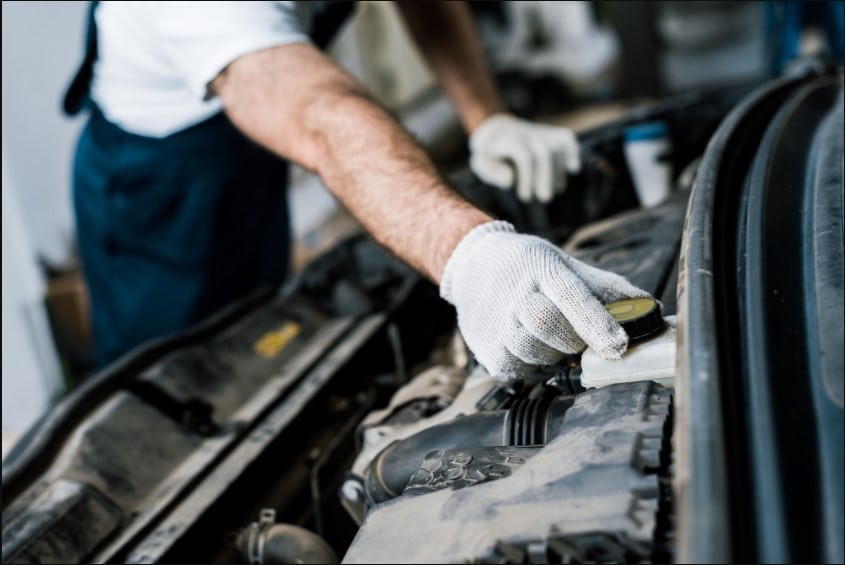Why Does My Oil Smell Like Gas? Here Are Explanations

Why Does My Oil Smell Like Gas?
Why Does My Oil Smell Like Gas? There are a few different reasons why your oil may smell like gas. The most common reason is that your car's engine is running too rich. This means that there's too much fuel and not enough air in the mix. As a result, the engine produces excess emissions, which can cause the oil to smell like gas. Another possible reason is that your car's fuel injection system is leaking. This can happen if the seals or gaskets in the system are worn out or damaged.

Why Does My Oil Smell Like Gas? If you've ever smelled your car's oil and thought it smelled like gasoline, you're not alone. In fact, this is a pretty common issue, particularly among newer cars. But what does it mean when your oil smells like gas? And more importantly, is it something to worry about? In this comprehensive overview, we'll answer all those questions and more. So read on to learn everything you need to know about why your oil smells like gas.
Why does my oil smell Like Gas?
If you've ever smelled your engine oil, and it smells like gasoline, then there's a good chance that you have a fuel smell problem. This can be caused by a number of things, and it's important to diagnose the root cause so that it can be fixed. Below, we'll discuss the causes of a fuel smell in engine oil. We'll also provide some helpful advice on how to prevent this issue from happening in the future.
Engine Misfire
If your car's oil smells like gasoline, it could be due to an engine misfire. When an engine misfires, it means that the air-fuel mixture in the cylinders is not detonating correctly. This can cause unburned fuel to enter the crankcase and mix with the oil. As a result, the oil will take on a gas-like smell. If you notice this problem, it's important to have your car checked by a mechanic as soon as possible.
Short Distance Drive
One of the most common reasons why your oil may smell like gas is because of a short-distance drive. When you only drive a short distance, the engine does not have a chance to reach its full operating temperature. As a result, the oil does not get hot enough to vaporize the fuel contaminants which can cause it to smell like gas. If you only drive a short distance on a regular basis, it is important to have your oil changed more frequently than the manufacturer's recommended interval. This will help to prevent the build-up of fuel contaminants in your oil and keep it smelling fresh.
Overly Rich Air/Fuel Ratio
If you notice that your oil smells like gas, it's likely due to an overly rich air/fuel ratio. This means that there's too much fuel in the mixture, and it's not being burned off completely. As a result, the unburned fuel is ending up in your oil. While this may not seem like a big deal, it can actually lead to some serious problems down the road. The good news is that this is relatively easy to fix. Simply adjust the air/fuel mixture so that there's less fuel being pumped into the engine. This will help to prevent the problem from recurring in the future.
Spark Plugs
Spark plugs are an essential part of your car's engine, and they can also be the reason why your oil smells like gas. The spark plugs are responsible for igniting the air/fuel mixture in the cylinders, and they can become fouled if they are not regularly cleaned. When this happens, the spark plugs can create a rich air/fuel mixture that can cause the oil to smell like gas. If you notice that your oil smells like gas, it is important to have your spark plugs checked by a qualified mechanic. They can clean the spark plugs and help prevent the problem from happening again.
Running Rich Fuel
Running rich fuel is the likely reason why your oil smells like gas. This happens when the air-fuel mixture delivered to the engine is too low in fuel, causing the engine to run lean. Since gas is more volatile than oil, it can easily enter the crankcase and contaminate the oil. Lean running can also cause fuel to enter the crankcase through the piston rings. If you suspect that your oil is contaminated with gasoline, have it checked by a qualified mechanic as soon as possible. Running rich fuel can damage engine parts and lead to costly repairs.
Bad piston rings
Many car owners may notice that their oil smells like gas. This is usually due to bad piston rings. When the piston rings are worn out, they allow oil to pass by and mix with the gasoline in the engine. This can cause a number of problems, including decreased fuel efficiency, increased emissions, and damage to the engine. In some cases, it may be necessary to replace the piston rings. However, in other cases, simply replacing the oil may be enough to solve the problem.
Faulty Injectors
If your car's oil smells like gas, it is most likely due to faulty injectors. When the injectors are not functioning properly, they can allow gas to enter the oil system. This can contaminate the oil and cause it to smell like gas. In some cases, the problem may be due to a leaking fuel injector O-ring. If this is the case, you will need to replace the O-ring in order to fix the problem.

Ignition System Issues
Your car's ignition system is responsible for providing the spark that ignites the fuel in the engine. When this system is not working properly, it can cause a variety of problems, including oil leaks and engine performance issues. One of the most common symptoms of an ignition system problem is a strong gasoline smell coming from the engine. This can be caused by a number of different things, including a faulty spark plug, a leaking fuel injector, or a problem with the ignition coil.
Pouring gas instead of oil
When your oil smells like gas, it's usually because you've poured gasoline into the oil instead of oil into the gas. If this happens, don't start the car. Doing so could cause serious damage. Instead, take the car to a mechanic and have it checked out. The mechanic will likely drain the oil and replace it with the correct type of oil.
They may also check for any damage that has been caused by the gasoline. In most cases, cars that have had gasoline poured into their oil will be fine after the oil has been replaced. However, if there is significant damage, you may need to have some repairs done. So, if you accidentally pour gasoline into your car's oil, be sure to get it to a mechanic right away.
No Oil Change for a while
It is important to get an oil change every 5,000 miles or every three months, whichever comes first. If you go too long without an oil change, the oil will break down and will not be able to properly lubricate the engine. The increased friction can cause the engine to overheat and ultimately fail. In addition, if the oil is not changed regularly, it can become contaminated with dirt and debris, which can also damage the engine. So if you're wondering why your oil smells like gas, it's likely because you haven't had an oil change in a while. Be sure to get one as soon as possible to avoid damaging your engine.
Faulty Carburetor (Older Cars)
If your car's oil smells like gas, it could be due to a faulty carburetor. The carburetor is responsible for mixing the right amount of fuel and air, and if it's not working properly, the mixture can be too rich in fuel. This can cause the engine to run too hot, which can cause the oil to break down and start to smell like gas. If you notice this problem, it's important to have your carburetor serviced by a qualified mechanic as soon as possible. Otherwise, you could end up damaging your engine and voiding your warranty.
What are the Symptoms of an Oil-gas Mixture?
Motor oil and gasoline are two common and important fluids that are used in cars. It's important to know the symptoms of a motor oil-gasoline mixture so that you can take the proper steps to remedy the situation. Below, we'll outline the most common symptoms of a motor oil-gasoline mixture. Stay safe on the road!
Dipstick Gas Smell
If your car's dipstick smells like gas, it could be a sign that your engine is running too hot. This, in turn, could be caused by an oil-gas mixture. When this happens, the oil burns along with the gasoline, and the result is a strong smell of gasoline. If you notice this smell, it's important to have your car checked out by a mechanic as soon as possible.
In most cases, an oil-gas mixture can be easily fixed by simply draining the oil and refilling it with fresh oil. However, if the problem is left unchecked, it can eventually lead to engine damage. So if you notice that your car's dipstick smells like gas, don't hesitate to take it to a mechanic for a check-up.
Strong Gas Smell
One of the most common causes of a strong gas smell is an oil-gas mixture. This can occur when gasoline or another petroleum product leaks into the oil tank. When this happens, the oil becomes contaminated and can no longer be used. If you suspect that your oil tank has been contaminated, it is important to have it inspected by a professional. In most cases, the tank will need to be replaced. However, if the contamination is caught early, it may be possible to clean the tank and avoid a costly replacement.

White Exhaust Smoke
White exhaust smoke usually indicates that your car is burning an oil-gas mixture. This can happen for a number of reasons, but the most common cause is incomplete combustion in the engine. When the mixture does not burn completely, it leaves behind a residue of soot and oil. In some cases, white exhaust smoke may also be caused by a coolant leak into the combustion chamber. If you notice white exhaust smoke coming from your car, it's important to have it checked out by a mechanic as soon as possible. While it may not be a serious problem, it could indicate underlying issues that need to be addressed.
High Oil Level
Symptoms of an oil-gas mixture in your car include a high oil level on the dipstick, a burning oil smell, blue or gray smoke coming from the tailpipe, and decreased engine performance. An oil-gas mixture can occur for a number of reasons, including overfilling the oil, using the wrong type of oil, or a problem with the seals in the engine. If you notice any of these symptoms, it's important to take your car to a mechanic as soon as possible to have it checked out. Left untreated, an oil-gas mixture can cause serious damage to your engine.
What Will Happen if Gas got into the Oil Pan?
If gas gets into the oil pan, it can cause serious engine problems. Below, we'll take a look at what can happen if gas leaks into the oil pan and how to prevent it from happening. So, whether you're a car owner or just curious about how engines work, read on for more information.
Fast Wear And Tear
If gasoline gets into the oil pan, it will cause the oil to break down and start to degrade. This will lead to accelerated wear and tear on the engine, and can ultimately cause engine failure. If you notice that your oil level is dropping faster than usual, or if your engine is making strange noises, then it's possible that gasoline has gotten into the oil pan and you should have it checked out by a mechanic as soon as possible. In the meantime, be sure not to add any more gasoline to the tank - use a different fuel if possible - and have the vehicle towed to a safe location until it can be repaired.
Waste of gas and reduction in fuel economy
If gasoline gets into the oil pan, it will cause a waste of gas and a reduction in fuel economy. The gas will mix with the oil and create a sludge that will clog up the engine. This will cause the engine to work harder and use more fuel. Additionally, the gas will evaporate and leave behind a residue that will reduce the efficiency of the oil. As a result, your car will get fewer miles per gallon and produce more emissions. So, if you notice that your car is losing fuel economy or emitting more exhaust, be sure to check the oil pan for gasoline contamination.

Affecting oil viscosity
If you notice that your car's oil looks like it has a gas topping, don't be alarmed. A little gasoline in the oil pan is not going to do any harm. However, if there is a lot of gas mixed in with the oil, it can affect the viscosity of the oil and cause engine problems. The easiest way to tell if there is too much gas in the oil is to check the oil level on the dipstick. If the oil level is higher than usual, it may be because the oil is diluted with gas.
You should also check the color of the oil. If it looks like there is gasoline present, it's best to take your car to a mechanic and have the oil changed. Running your car with too much gas in the oil can cause damage to your engine over time, so it's best to be safe and get it checked out as soon as possible.
Overheating engine
If you notice that your car's engine is overheating, it could be a sign that gas has gotten into the oil pan. This is a serious problem that can lead to engine damage, so it's important to take action right away. One way to check for this issue is to look for gas bubbles in the radiator. If you see any, it's likely that gas has entered the oil pan.
Another symptom of this problem is a loss of power while driving. If your car starts to lose power or backfire, it's time to take your vehicle to a mechanic for a tune-up. Gas in the oil pan is a serious issue that should be fixed as soon as possible. Ignoring it could lead to costly repairs down the road.
Take your car to a mechanic as soon as possible if you notice any of these symptoms! An oil-gas mixture can cause serious damage and it's important not just for the engine but also because we don't want gasoline mixed in with our precious fluids. Make sure that there isn’t too much fuel coming out when filling up. Otherwise, this will lead to overfilling which could result in fires or other issues down South Central Avenue (or wherever). If something seems off about how often they're changing their own lubricants at least once per month then consider getting them checked out sooner rather than later!
Is Gasoline in Oil Visible?
It's not unusual to find gasoline in oil, but it's not always visible. Gasoline is a petroleum product, and oil is a mixture of petroleum products. Gasoline consists of hydrocarbons - molecules made up of carbon and hydrogen. Crude oil also contains hydrocarbons, but it also contains other things like sulfur, nitrogen, and oxygen. The boiling point of gasoline is lower than the boiling point of crude oil, so when crude oil is refined to make gasoline, some of the lighter hydrocarbons evaporate and are condensed into a vapor.

This process is called fractional distillation. The vapor is then cooled and condensed into a liquid, which is called gasoline. Because the refining process separates the different hydrocarbon molecules by weight, the end result is a mixture of hydrocarbon molecules that have different sizes and shapes. As a result, gasoline is a clear liquid, while crude oil is usually dark-colored and opaque. However, you might be able to see small amounts of gasoline in oil if the oil has been contaminated with gasoline. Gasoline will float on top of the oil and will be visible as a layer of clear liquid.
Is It Safe to Drive If You Smell Gas in Your Engine Oil?
If you smell gas in your engine oil, it's important to take action immediately. Gasoline is highly combustible, and if there's a leak in your engine, it could lead to a fire. Furthermore, inhaling gasoline fumes can be harmful to your health.
If you suspect that there's a gas leak in your engine, the first thing you should do is turn off the engine and check for any leaks. If you see any gasoline leaking from the engine, do not start the car. Instead, call a tow truck or roadside assistance to take your car to a nearby service station. Once at the service station, a mechanic will be able to repair the leak and refill your engine with fresh oil.

In short, if you smell gas in your engine oil, it's important to take action immediately to avoid any potential hazards. If you're not sure how to proceed, don't hesitate to seek help from a professional.
How Does Gas Get Mixed with Oil?
Most people are familiar with the basics of how a car engine works. Gasoline is combusted in the cylinders to create energy that turns the crankshaft, which in turn spins the wheels. However, what many people don't realize is that motor oil plays an essential role in this process. Not only does it lubricate the engine parts and help to keep them cool, but it also helps to prevent gasoline from getting into the oil. So how does gasoline get mixed with motor oil?
The answer lies in the design of the engine. Gasoline is combusted in the cylinder, but it doesn't all burn off immediately. Some of it gets forced past the piston rings and into the crankcase, where the oil is stored. Over time, this can lead to a build-up of gasoline in the oil, which can cause engine damage. To prevent this from happening, most engines have a PCV (positive crankcase ventilation) valve. This valve allows some of the pressure from the crankcase to be released, while also keeping any oil vapors from escaping. As a result, it helps to keep the crankcase clean and prevents gasoline from getting into the motor oil.

However, the PCV valve is not 100% effective, and over time, it can become clogged or damaged. When this happens, it can allow gasoline to get into the oil. Additionally, if the engine is running too rich (there's too much gasoline and not enough air), this can also lead to gasoline getting into the oil.
How to fix oil that smells like gas?
As any car owner knows, oil is an essential component of a healthy engine. Not only does it lubricate moving parts, but it also helps to dissipate heat and prevent corrosion.
https://autoemc.net/blog/why-does-my-oil-smell-like-gas/
Nhận xét
Đăng nhận xét